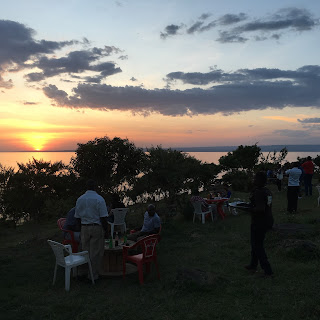The timeliness of watching
Meet Joe Black early in the Easter week experienced here in Chogoria became
apparent only late Sunday evening. Joe Black, played by a young frosty-tipped
Brad Pitt, is perhaps the most attractive physical embodiment of Death ever
created. He comes to get a taste of life the best way possible: alongside
wealthy media mogul Bill Parrish (Anthony Hopkins) who is approaching the
celebration of his 65th, and apparently last, year. A bit naïve to
the daily jargon of life, Mr. Black at one point interrupts a board meeting of Parrish’s
company when a board member mentions the certainty of death and taxes. “Death and taxes?” he asks, appearing
confused and offended.
This week, the inevitability
of physical death and the promise of life beyond death were juxtaposed in a way
that leaves one pondering most proximately what awaits the deceased after life’s
most final event.
--
The transition from old
class of Medical Officer (MO) Interns to new class of MOIs came rapidly.
Highlighted by wrapping up Advanced Cardiac Life Support (ACLS) training and a pot-luck
goat roast funded by the hospital Wednesday night complete with speeches from
much of the medical staff, the outgoing MOIs were done with their Intern year
and headed out to work in various posts around the country. The new MOIs were
now on their own, running each of the inpatient services and independently taking
care of patients in the outpatient clinic.
The week after their ACLS
training, a new MOI and one of our residents led a resuscitative success with a
young poorly controlled hypertensive patient. She was shocked once and after
some chest compressions and correcting her potassium level, she was alive.
Depending on the etiology, resuscitations commonly end with death. And this
past week saw a couple of attempts to revive extremely sick patients that ended
poorly.
We showed up for rounds
Thursday morning to find one of the two MOIs on our service missing. She had
gone for a break after spending four of the early morning hours attempting to
resuscitate, and eventually losing, two newly admitted patients. One
transferred from another hospital down the road, another with severe lower
gastrointestinal bleeding. Neither lived to be seen by our staff in the
morning. The fellow MOI covered for his teammate. “She is not in a good
emotional state, so she went to the house.” I was glad the MOI had made the
wise decision to take a break to regroup after a rough morning.
She returned an hour
later. No matter how she felt, a busy medical ward needed to be cared for and
she was their primary physician. The last couple weeks our ward has had many
interesting guests including the rare case of malaria, some brittle diabetics, an
older man celebrating his discharge on the same day as his neighbor’s (“The two
old men are going home!”), and the police officer who was visited on the ward
by his four colleagues wielding a baton, an automatic rifle, and a newspaper.
Towards the end of rounds,
the five-member family of our latest death appeared requesting to speak with
the MOI. The head sister (nurse) in charge on the ward motioned for me to
accompany her and the MOI in the discussion.
What do you say to someone
who has had a family member recently pass away? What if you were the one
entrusted with keeping them alive?
Many family members here
in our area drop off their family members toward the end of life when they
sense they cannot provide proper care for their loved one. We then do our best
to control their pain and keep them comfortable, managing complications of advancing
cancerous masses, bladder obstructions, severe systemic infections, and
decreased oral intake. There is no Do-Not-Resuscitate (DNR) order here, so the
attempts to revive, and their extent, are decided many times unilaterally by
the MOI on call.
The MOI conducted the
family meeting in a mixture of Kiswahili and English. She explained in detail
the state in which the patient came in, the resuscitation attempt including who
was present and what was achieved, and eventually when the elderly gentleman
died. The nurse answered practical questions about morgue costs and how they
could pay the hospital bill when they eventually took the patient for burial.
The patient’s daughter knew death was imminent, she said. “I just didn’t think
it would be this morning.” They thanked us and went to view their patriarch one
last time.
The MOI admitted afterwards
that she had never broken the news of a death to a family. So we debriefed,
talking mostly about what she had done well and then what she could improve on
for the next time. Remain objective, but show empathy. Discuss details in plain
language, but only as much to be complete and adequately informative. Was my
approach molded within the American system appropriate for this community? My
MOI and I came to a few conclusions. Discussing death is never easy and always
different depending on the circumstances and the family.
He was called in to assist
with the deteriorating patient we had dealt with for a week-and-half. She had
just given birth to a healthy baby three weeks prior. Originally diagnosed 10
days ago as septic shock due to her low blood pressures and spiking fevers, a
poor condition due to wide-spread infection, and treated with intravenous
hydration and several powerful antibiotics, she was not improving. Further
investigation with a bedside echocardiogram revealed a heart that was almost
not contracting at all and a massive blood clot left by the stagnant blood in
her left ventricle. Postpartum, or peripartum, cardiomyopathy was the new
diagnosis and we prepared to transfer her to a higher level of care. Our
hospital is usually the referral hospital for several smaller facilities
nearby, but now we needed help. Before she could be transferred however, she
passed away early Sunday afternoon. Her three-week-old infant laid wrapped on
the nearby twin bed in the private room with grandmother sitting next to the
baby.
--
No matter how inevitable,
no matter the medical training in objectivity, death hurts. Seeing a death that
leaves a healthy three-week-old without her mother begs the obvious question of
“Why?”
Following the death of a
patient, the discussion many times revolves around justifying both to ourselves
and the family that we did “everything we could.” But had we in these cases?
Did we have sufficient knowledge, medications, specialists, technology to “do
everything?” No way. Had she given birth in my hometown of Austin, her chances
of survival would have greatly increased. We could take comfort in knowing we
did all that was possible within the constraints of our local system. But considering
all the resources available on this planet, we had not truly “done everything.”
Life is precious and
perhaps work in medicine offers a close-up yet lopsided view of just how
quickly life can change.
Following the grand
birthday celebration at the end of the movie and after Parrish has accepted his
long, fulfilling life is over, Joe Black and Bill Parrish disappear over the
bridge to his death. How peaceful. That romantic depiction of life and its end
can occasionally be disrupted. Shaken by a lack of control and confronted with
physical death, there must be something beyond that bridge, beyond the mother
leaving her infant, that offers hope.
There is so much we can affect in modern medicine, but sometimes death comes. I choose to think Death came as Brad Pitt here in Chogoria. Perhaps I was just too blinded by the circumstances to even see him.
 |
| Sunset over Lake Victoria |













